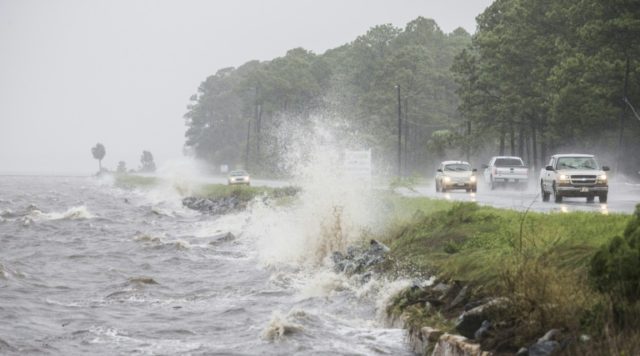Miami (AFP) – Hermine uprooted trees, flooded streets and blew out power Friday as the hurricane swept across Florida’s Gulf coast, grinding down to tropical strength as it moved north into Georgia.
A homeless man was killed by a falling tree, Florida Governor Rick Scott said.
There were no other reports of injuries but emergency crews worked “non-stop” overnight, rescuing 18 people from rising flood waters in Florida’s Pascoe country, and several families in Hernando County, Scott said.
“Today, we know there is a lot of work left to do following this storm,” the governor said in a statement.
“The number one thing is to stay safe,” he said. “Life-threatening coastal flooding and rip currents will continue and we must all remain vigilant.”
Overall, the region appeared to have weathered the storm well, to the relief of local officials.
“Things are great here,” said Van Johnson, the mayor of Apalachicola, near where Hermine roared ashore at hurricane strength around 1:30 am local time (0530 GMT).
“We didn’t experience any of the expected storm surges, damage to property. Things are great. The city fared well,” he told CNN.
Crews were out clearing away fallen trees and branches, and looking for downed power lines.
Scott said 253,000 people were without power.
“Stay out of standing water especially near power lines,” Scott advised Floridians.
Tallahassee mayor Andrew Gillum said many power lines and trees were down and 100,000 customers left without electricity in his area.
“Our crews are right now out and surveying the damage,” he told CNN.
He warned residents to stay inside while the authorities ensured there was no threat from live downed power lines and other potential dangers.
“If you don’t have to be out, don’t go out,” he said.
– Heading for US East Coast –
At 1500 GMT, Hermine was 55 miles (90 kilometers) southwest of Savannah, Georgia on a northeasterly track that threatened to bring heavy rains, flooding and tornadoes up the East Coast on the country’s summer-ending Labor Day weekend.
It was packing sustained winds of 55 miles (85 kilometers) per hour, the Miami-based National Hurricane Center said, warning of possible storm surges as it moves up the mid-Atlantic region.
Heavy rain and winds were moving into South and North Carolinas as the storm advanced, the center said.
Storm warnings were up as far north as Delaware, and storm watches were posted from New Jersey to Rhode Island, it said.
“There is a danger of life-threatening inundation during the next 48 hours” in coastal areas from North Carolina to Connecticut, the NHC said.
Hermine was the first hurricane to hit Florida in 11 years since Hurricane Wilma in 2005.
Its winds rose up to 80 miles (130) per hour before it came ashore just east of the town of St Marks on Florida’s Apalachee Bay.
Local television stations broadcast video footage of buffeting winds, lashing rain and flooded streets.
The last hurricane to make landfall in the United States was Arthur in 2014 in North Carolina.
Pentagon spokesman Jeff Davis said 100 Florida National Guard personnel were activated, with 6,000 more on alert in the state and 34,000 ready to deploy from elsewhere in the United States.
President Barack Obama has asked FEMA administrator Craig Fugate to keep him updated on the situation “and to alert him if there are any significant unmet needs”, said White House spokesman Josh Earnest.
Hermine is expected to dump a total of five to 10 inches (12 to 25 centimeters) of rain over the southeastern United States, with possible isolated maximum amounts of 15 inches.
“These rains may cause life-threatening floods and flash floods,” it said.
“A few tornados are possible across coastal portions of North and South Carolina today,” the NHC said.
Georgia has declared a state of emergency in 56 counties, and North Carolina in 33 counties.

COMMENTS
Please let us know if you're having issues with commenting.